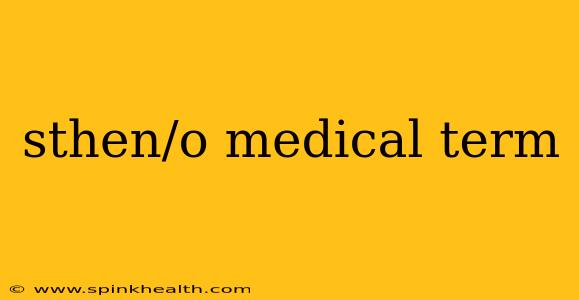The medical term "sthen/o" might not be a household name, but it's a crucial component in understanding various medical conditions and treatments. This root word, derived from Greek, simply means "strength." But its implications within the medical field extend far beyond a simple definition; it offers a glimpse into the body's capabilities and vulnerabilities. Let's delve deeper into what sthen/o represents and how it's used in medical terminology.
Imagine yourself lifting a heavy weight. That exertion, that power, that very capacity for strength – that's what sthen/o encapsulates in the medical world. It's not just about physical might; it also relates to the strength of bodily functions, the vigor of systems, and even the resilience of the immune response.
What does sthen/o mean in medical terms?
As mentioned, sthen/o signifies strength or power. In medical contexts, this can refer to:
- Physical Strength: The capacity of muscles and the skeletal system to exert force.
- Functional Strength: The ability of organs and systems to perform their designated tasks effectively. For instance, the strength of the heart in pumping blood or the strength of the lungs in facilitating respiration.
- Immune Strength: The body's ability to combat disease and infection. A robust immune system is often referred to as being "strong."
What are some medical terms that use sthen/o?
While "sthen/o" isn't always explicitly stated, its implication underpins numerous medical terms. Many terms describe conditions related to weakness or lack of strength, often employing prefixes like "a-" (without) or "asthenia" (weakness) which directly contrast the strength implied by "sthen/o." Examples include:
- Asthenia: This is a common medical term meaning weakness or debility. It's often a symptom of underlying conditions rather than a disease itself. The prefix "a-" negates the inherent strength suggested by "sthen/o."
- Myasthenia gravis: This neuromuscular disorder involves progressive muscle weakness and fatigue. The term directly contrasts with the strength implied by sthen/o. The "myo" refers to muscle.
While you won't find many words directly using "sthen/o," understanding its core meaning allows for a deeper grasp of the nuances within medical terminology. It highlights the contrast between strength and weakness, providing crucial context when interpreting medical conditions and treatments.
How is sthen/o used in diagnosis and treatment?
Understanding the concept of "sthen/o" aids in diagnosing conditions involving weakness. Doctors assess patients' physical, functional, and immune strength to identify potential underlying problems. For example, assessing muscle strength is a routine part of neurological exams. Similarly, evaluating immune system strength might involve blood tests to measure antibody levels.
Treatment strategies often focus on improving or restoring the body's strength, whether through physical therapy, medication, or lifestyle changes.
What conditions relate to a lack of sthen/o (weakness)?
Many conditions can result in a deficit of "sthen/o," meaning weakness or lack of strength. Some of these include:
- Muscular Dystrophy: A group of genetic disorders that cause progressive muscle weakness and degeneration.
- Multiple Sclerosis (MS): An autoimmune disease affecting the brain and spinal cord, leading to muscle weakness and other neurological symptoms.
- Myasthenia Gravis: As mentioned earlier, a neuromuscular disorder characterized by muscle weakness and fatigue.
- Chronic Fatigue Syndrome (CFS): A complex and poorly understood condition marked by severe fatigue that lasts for at least six months and doesn't improve with rest.
- Malnutrition: Lack of essential nutrients can severely weaken the body, impacting muscle strength and immune function.
Understanding "sthen/o" enhances medical comprehension. While not overtly used in many everyday medical terms, grasping its meaning clarifies the concepts of strength and weakness within the human body, offering valuable insight into both health and disease.

